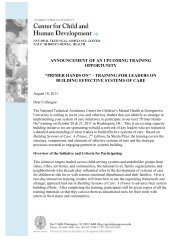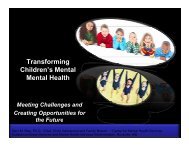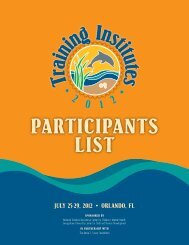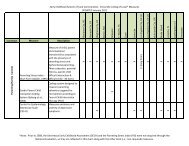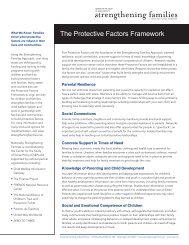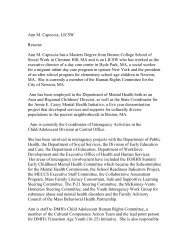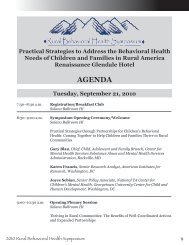Training Institutes 2012 - National Technical Assistance Center for ...
Training Institutes 2012 - National Technical Assistance Center for ...
Training Institutes 2012 - National Technical Assistance Center for ...
Create successful ePaper yourself
Turn your PDF publications into a flip-book with our unique Google optimized e-Paper software.
INSTITUTES<br />
• Population-focused planning <strong>for</strong> a CME approach, including use of utilization and expenditure data from across<br />
systems to identify potential populations of children and youth <strong>for</strong> CME involvement<br />
• Rate structuring and financing approaches, including cross-agency financing<br />
• Uses of Medicaid, including options such as 1915(i), 1915(c), and 1915(a), and approaches to embedding CMEs into<br />
the larger delivery system<br />
• The role of family and youth peer partners and strategies <strong>for</strong> developing, financing, and sustaining family and youth<br />
peer capacity<br />
The Institute will include segments from a video featuring states using a CME approach. Participants will also have<br />
opportunity to share their own experiences in planning and implementing CMEs. The Institute will offer the<br />
perspectives of a family member involved in the development of a CME approach; a Medicaid administrator; a child<br />
welfare administrator; a director <strong>for</strong> a federal grant supporting a three-state CME Quality Collaborative; and a national<br />
expert on organizing and financing delivery systems <strong>for</strong> children involved in multiple systems.<br />
MODERATOR/PRESENTER: Sheila Pires, M.P.A., Partner, Human Service Collaborative, Washington, DC<br />
Nichole Anderson, Assistant Deputy <strong>for</strong> Policy and Legislation, Wyoming Department of Family Services, Cheyenne, WY<br />
Brian Dowd, Program Director Waiver Programs, Medicaid/Aging and Special Populations, Department of Community<br />
Health Georgia, Atlanta, GA<br />
Deborah Harburger, M.S.W., L.G.S.W., Director, Fiscal Strategy Unit, The Institute <strong>for</strong> Innovation and<br />
Implementation, University of Maryland School of Social Work, Baltimore, MD<br />
Dana McCrary, Parent & Youth Peer Specialist Coordinator, Children’s Health Insurance Reauthorization Act (CHIPRA),<br />
Office of Medicaid Coordination, Department of Behavioral Health and Developmental Disabilities, Atlanta, GA<br />
RESOURCE PERSON: Dayana Simons, M.Ed., Senior Program Officer, <strong>Center</strong> <strong>for</strong> Health Care Strategies, Inc.,<br />
Hamilton, NJ<br />
INSTITUTE #4 1:30 PM THURSDAY • 8:30 AM SATURDAY • SUN C<br />
Through the Looking Glass: Implementing Wraparound Practice<br />
Through the Lens of Implementation Science<br />
OBJECTIVES—Participants will learn:<br />
1. To describe the core theories and concepts of implementation science<br />
2. To discuss how implementation science is applied to successful implementation of systems of care and the<br />
wraparound practice model<br />
3. How to use the lens of implementation science to learn specific strategies to address the major implementation<br />
issues often associated with implementing wraparound, such as assessing and improving system and organizational<br />
supports; staff selection; staff training, coaching, and supervision; and evaluation and continuous quality improvement<br />
4. To identify and address implementation barriers and implementation support needs in their own local or state system<br />
of care.<br />
This Institute will provide a new, research-based perspective that can help prioritize and select strategies that will<br />
facilitate successful implementation of the wraparound practice model <strong>for</strong> youth with the most serious and complex<br />
needs in systems of care. Faculty will provide participants with an overview of the science of implementing evidencedbased<br />
and promising practices relevant to systems of care and wraparound. They will also describe specific<br />
implementation drivers and how they impact practice.<br />
Each implementation driver will be based on work of the <strong>National</strong> Wraparound Initiative (www.nwi.pdx.edu) and/or<br />
linked to a specific method through which the University of Maryland’s Institute <strong>for</strong> Innovation and Implementation has<br />
ensured high-quality implementation of wraparound and the necessary services that must be in place to support<br />
wraparound teamwork.<br />
The faculty will walk participants through the looking glass by applying implementation science to wraparound<br />
implementation. Specific topics to be covered include:<br />
36 <strong>Training</strong> <strong>Institutes</strong> <strong>2012</strong>



